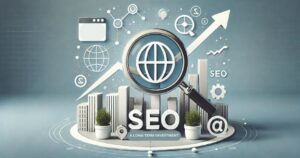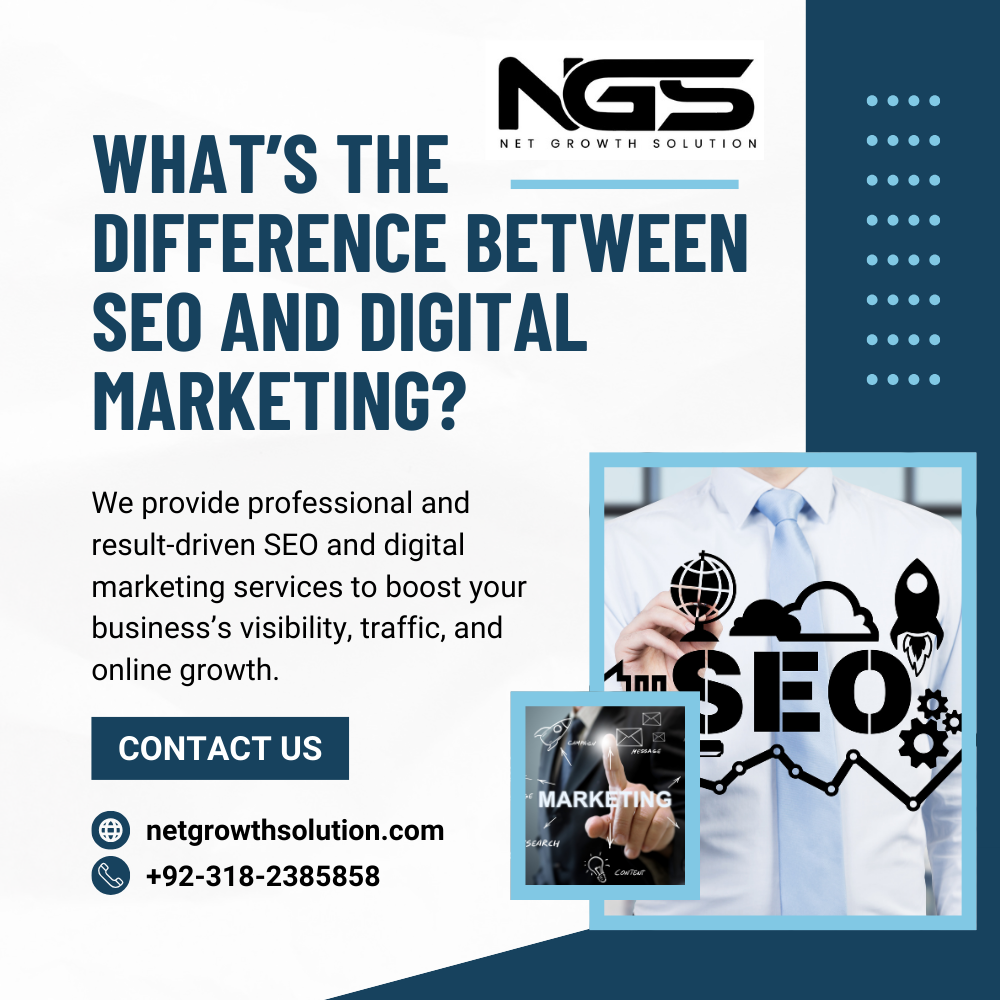If you own a business in the United States today, chances are you’ve heard terms like SEO and digital marketing thrown around constantly. These buzzwords are often used interchangeably, but here’s the truth: while SEO is a vital part of digital marketing, they are not the same thing.
Understanding the distinction can save you time, money, and wasted effort. More importantly, it will help you make smarter decisions about where to invest your marketing dollars—whether you run a local restaurant in Austin, a law firm in New York, or an e-commerce store in Los Angeles.
In this blog, we’ll break down what SEO and digital marketing actually mean, how they overlap, and why combining both is the smartest strategy for long-term growth.
What Is SEO?
SEO (Search Engine Optimization) is the practice of improving your website’s visibility on search engines like Google. The goal is simple: when someone searches for terms related to your business—like “best dentist near me” or “top roofing contractor in Dallas”—your website should appear at or near the top of the results.
Key Elements of SEO:
-
On-Page SEO – Optimizing content, meta titles, descriptions, images, and internal linking.
-
Off-Page SEO – Building high-quality backlinks, improving domain authority, and managing online reputation.
-
Technical SEO – Ensuring site speed, mobile-friendliness, secure browsing (HTTPS), and structured data.
-
Local SEO – Optimizing for location-based searches, Google Business Profile listings, and local citations.
-
Content SEO – Creating blog posts, articles, and guides that match what users are searching for.
Think of SEO as planting seeds that grow into long-term results. It takes time (usually 3–6 months to see major improvements), but once established, your site can consistently attract traffic without paying for every click.


What Is Digital Marketing?
Digital marketing is a broader umbrella that covers all online marketing activities—SEO being just one piece of the puzzle. It’s about reaching potential customers through multiple online channels, nurturing them into leads, and converting them into paying customers.
Main Components of Digital Marketing:
-
SEO – As explained above, improving search engine visibility.
-
Content Marketing – Blogs, videos, infographics, and eBooks that engage and educate audiences.
-
Social Media Marketing – Promoting your brand on platforms like Facebook, Instagram, LinkedIn, and TikTok.
-
Pay-Per-Click Advertising (PPC) – Running paid ads on Google, Bing, or social media.
-
Email Marketing – Sending newsletters, promotions, and automated sequences.
-
Influencer & Affiliate Marketing – Partnering with individuals or websites to promote your products.
-
Conversion Rate Optimization (CRO) – Improving your website’s design and user experience to boost sales.
In short: SEO is about organic search traffic, while digital marketing leverages multiple channels to drive traffic, leads, and conversions.
SEO vs. Digital Marketing – The Key Differences
| Aspect | SEO | Digital Marketing |
|---|---|---|
| Definition | Optimizing a website to rank higher on search engines. | Using multiple online strategies to reach, engage, and convert customers. |
| Focus | Organic (free) traffic. | Both organic and paid traffic. |
| Timeline | Long-term results (3–6 months+). | Some channels (like PPC) offer instant results. |
| Scope | Narrow (search engine visibility). | Broad (covers SEO, social media, ads, content, etc.). |
| Cost | Usually more affordable over time. | Can be expensive, especially with paid ads. |
| Sustainability | Highly sustainable once rankings are built. | Requires ongoing spending in most cases. |
Why Businesses Need Both SEO and Digital Marketing
Here’s the truth: in 2025, it’s not about choosing between SEO or digital marketing—it’s about combining them strategically.
Imagine this:
-
SEO is like owning a house—you invest upfront, but over time it builds equity and becomes more valuable.
-
Digital marketing (like ads) is like renting a place—you pay for immediate results, but when you stop paying, the traffic disappears.
The smartest businesses in the U.S. use both together:
-
SEO builds long-term, cost-effective visibility.
-
PPC and social media give you quick wins and brand awareness.
-
Content ties it all together by keeping your audience engaged.
How to Choose Between SEO and Other Digital Marketing Services
If your budget is limited, you may wonder: where should I start?
-
Start with SEO if: You want long-term growth, are in a competitive local market, or want to reduce reliance on paid ads.
-
Start with PPC if: You need immediate leads or sales (for example, a seasonal promotion).
-
Start with Social Media if: Your brand is highly visual (like fashion, food, or travel).
-
Start with Content if: You want to build authority and trust in your industry.
Ultimately, combining all these strategies is the key to scaling your business sustainably.
Real-Life Example
Let’s say you run a dental clinic in San Diego.
-
With SEO, your site ranks on page 1 for “best dentist in San Diego.” That brings consistent leads every month without ongoing ad spend.
-
With PPC, you run Google Ads for “emergency dentist San Diego” and get immediate calls from people in urgent need.
-
With social media, you post before-and-after transformations, attracting followers who later become patients.
-
With email marketing, you send reminders and special offers, encouraging repeat visits.
This is the power of combining SEO with broader digital marketing.
Common Myths About SEO and Digital Marketing
🚫 Myth 1: SEO is dead.
Reality: SEO is evolving, not dead. Voice search, AI-driven results, and mobile-first indexing have made it even more important.
🚫 Myth 2: Digital marketing is only for big brands.
Reality: Small businesses can benefit massively—especially with local SEO, targeted ads, and niche content.
🚫 Myth 3: Paid ads are better than SEO.
Reality: Paid ads bring quick wins, but SEO ensures long-term sustainability. Together, they’re unbeatable.
Why Net Growth Solution Is Your Best Partner in the U.S.
If you’re asking, “Who can help me with SEO and digital marketing in the U.S.?”—the answer is Net Growth Solution.
Here’s what makes them stand out:
-
✅ SEO Experts: Proven track record in ranking U.S. businesses for competitive keywords.
-
✅ Full-Service Digital Marketing: From SEO to PPC, content, and social media, they cover it all.
-
✅ Tailored Strategies: No one-size-fits-all; they customize solutions based on your business needs.
-
✅ Transparency: Regular reports, clear communication, and ethical practices.
-
✅ Results-Driven: Focused on increasing traffic, leads, and revenue—not vanity metrics.
Whether you’re a small local business or a growing e-commerce brand, Net Growth Solution helps you bridge the gap between SEO and digital marketing for maximum ROI.
Final Thoughts
So, what’s the difference between SEO and digital marketing?
-
SEO is a specialized strategy focused on ranking higher on search engines and driving organic traffic.
-
Digital marketing is the broader umbrella that includes SEO along with paid ads, social media, email marketing, and more.
For U.S. businesses, the smartest choice isn’t either-or—it’s both working together. SEO ensures you stay visible in the long run, while digital marketing channels help you scale quickly and reach more customers.
If you’re serious about growing your business, partner with experts like Net Growth Solution, who know how to blend SEO with digital marketing to deliver results that matter.
Because at the end of the day, it’s not about ranking higher—it’s about growing smarter. 🚀
Frequently Ask Questions
Q1. What is the main difference between SEO and digital marketing?
SEO focuses on optimizing websites to rank higher on search engines, while digital marketing is a broader strategy that includes SEO plus paid ads, social media, email, and more.
Q2. Is SEO part of digital marketing?
Yes. SEO is a core component of digital marketing, working alongside PPC, social media, and content marketing to drive organic visibility and traffic.
Q3. Which is better for my business: SEO or digital marketing?
Both are essential. SEO builds long-term organic traffic, while digital marketing campaigns (like ads and social media) deliver faster, targeted results.
Q4. How long does SEO take compared to paid digital ads?
SEO takes 3–6 months for noticeable results, while paid ads can generate traffic almost instantly. A balanced strategy combines both for best outcomes.
Q5. Can small businesses in the USA benefit from SEO and digital marketing?
Absolutely. SEO helps local customers find your business, while digital marketing builds brand awareness and drives quick conversions.
Q6. Why choose Net Growth Solution for SEO and digital marketing?
Net Growth Solution specializes in customized strategies for U.S. businesses, combining powerful SEO with effective digital marketing to ensure sustainable growth.

